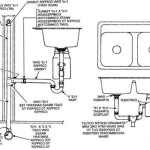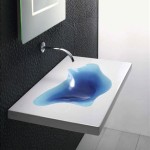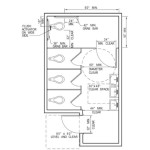Why Does My Bathroom Sink Smell Like Sewer Gas: Essential Aspects
The unpleasant smell of sewer gas emanating from your bathroom sink can be a distressing issue. Understanding the essential aspects behind this odor is crucial for effective troubleshooting and resolution. This article delves into the underlying causes, potential risks, and essential solutions to address and prevent sewer gas odor in your bathroom sink.
Causes of Sewer Gas Odor in Bathroom Sink
1. P-Trap Dryout: The P-trap, a curved portion of the drainpipe beneath the sink, is designed to hold water, creating a barrier that prevents sewer gases from escaping into the room. However, when the sink is not used regularly, the water in the P-trap can evaporate, allowing sewer gases to permeate through.
2. Damaged or Disconnected Vent Pipe: A vent pipe is a vertical pipe that runs from the drain to the roof. Its purpose is to provide an outlet for sewer gases to escape the plumbing system. If the vent pipe is damaged or disconnected, sewer gases can accumulate within the pipes and discharge into the bathroom through the sink drain.
3. Obstructed Drain Line: A blockage in the drain line can cause water to back up, leading to the accumulation of organic matter and the production of hydrogen sulfide gas, which contributes to sewer gas odor.
Risks of Sewer Gas Inhalation
1. Respiratory Issues: Sewer gas contains harmful gases like hydrogen sulfide and methane, which can irritate the lungs, causing coughing, shortness of breath, and respiratory distress.
2. Headaches and Dizziness: Inhaling sewer gas can lead to headaches, dizziness, and nausea due to the presence of carbon monoxide and other toxic gases.
3. Long-Term Health Effects: Prolonged exposure to sewer gas can potentially increase the risk of developing chronic respiratory conditions and other health issues.
Solutions for Bathroom Sink Sewer Gas Odor
1. Restore P-Trap Water: Run water through the sink regularly to keep the P-trap filled. Alternatively, pour a cup of mineral oil or vegetable oil into the drain to create a temporary seal.
2. Inspect and Repair Vent Pipe: Check the vent pipe for any damage or disconnections. Hire a plumber to repair or replace the vent pipe if necessary.
3. Clear Drain Obstruction: Use a drain cleaner or a plumbing snake to remove blockages from the drain line. Regular cleaning can help prevent buildup and maintain proper drainage.
4. Install an Activated Carbon Filter: Installing an activated carbon filter in the sink drain can absorb sewer gases and trap odors.
5. Maintain Proper Ventilation: Ensure adequate ventilation in the bathroom by opening windows or using an exhaust fan to promote air circulation and disperse sewer gases.
Eliminating sewer gas odor in your bathroom sink not only enhances the aesthetics and hygiene of your space but also safeguards your health and well-being. By understanding the essential aspects of this issue and implementing the suggested solutions, you can effectively resolve the issue and enjoy a fresh and pleasant bathroom environment.

Sewer Smell In Bathroom Solved Bob Vila

My Bathroom Smells Like A Sewer What Causes That And How Do You Fix It Kitchen Infinity

What Causes Bathroom Drains To Smell

How To Clean A Stinky Sink Drain Home Repair Tutor

Bathroom Smells Like Sewage Causes Fixes Inside Out

Sewer Smell In Bathroom Identify And Eliminate The Odor

How To Get Rid Of The Sewer Smell From A Bathroom Terry S Plumbing

Why Does My Bathroom Sink Smell Like Sewer Top Causes
My Bathroom Smells Bad But Only When Its Hot Outside It Also Will Slightly Go Away I Run The Sink And Toilet Bathtub Any Thoughts On What Is

Why Is There A Sewer Odor In My Bathroom Ben Franklin Bay Area







